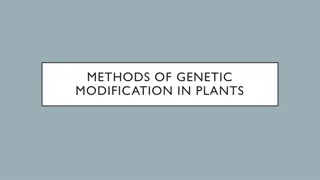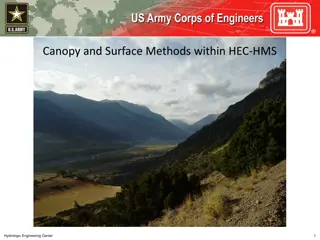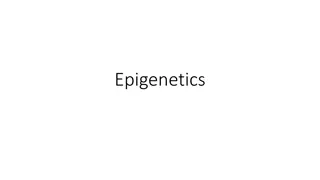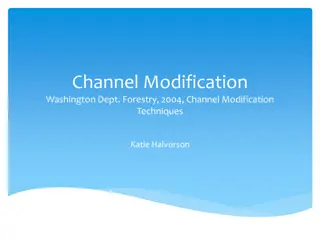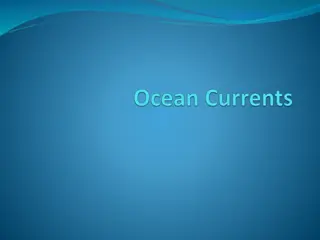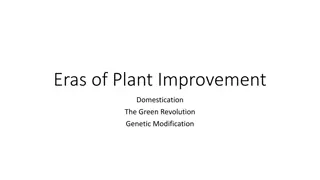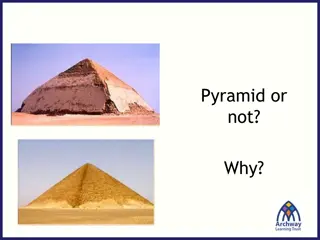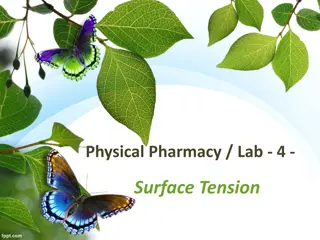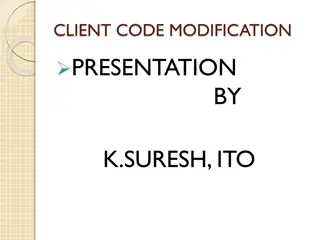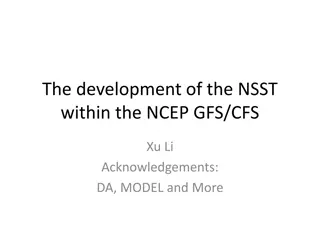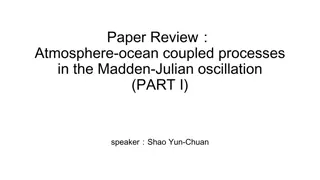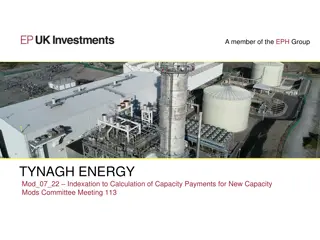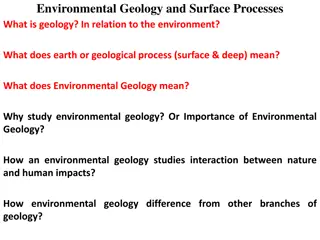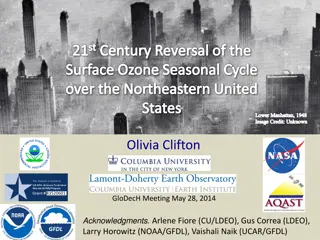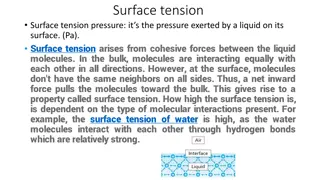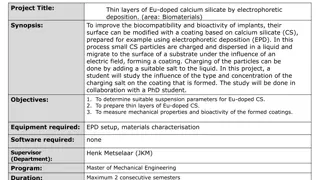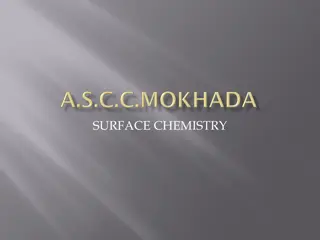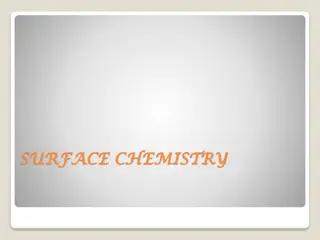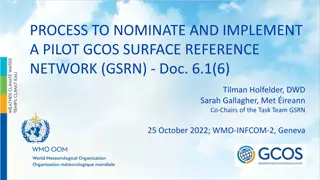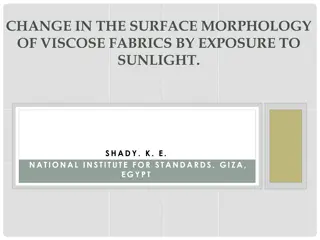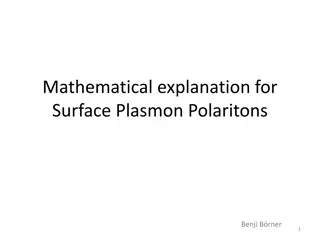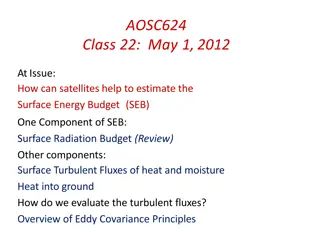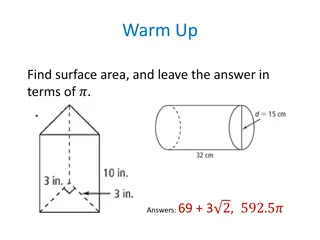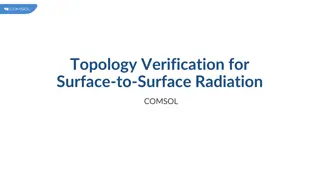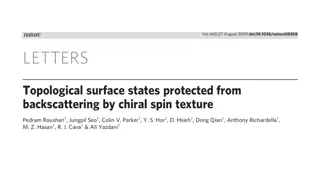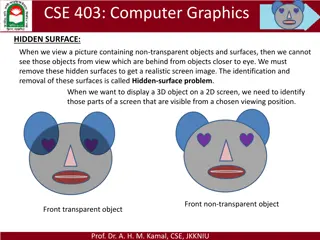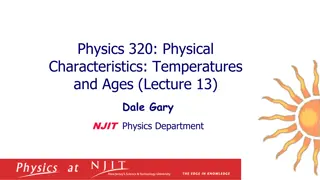Exploring Surface Tension and Wettability in Nature
Discover the fascinating world of surface tension and wettability through engaging experiments and observations, from water cohesion on a penny to the microscopic structures on lotus leaves. Delve into the role of cohesion and adhesion, surface wettability factors, and everyday applications of these
2 views • 17 slides
Understanding Surfaces and Interfacial Energy in Chemistry
Surfaces play a crucial role in free energy and dissolution processes, impacting surface tension and interfacial energy. Learn about the adsorption of molecules, surface excess properties, and the contributions of surface area and curvature to surface energy. Dive into concepts such as Laplace's equ
6 views • 71 slides
Class 2 Permit Modification Request
This Permit Modification Request (PMR) aims to transition audit scheduling for site recertification from an annual to a graded approach, incorporating DOE Orders and Quality Assurance program requirements. The PMR consolidates scheduling information, reduces redundancy, and clarifies subsequent audi
3 views • 22 slides
Different Methods of Genetic Modification in Plants
Genetic modification in plants can occur through natural selection, selective breeding, and induced mutations. Natural selection involves breeding compatible species to create offspring with desired traits, while selective breeding is a multi-generational process to breed organisms with specific cha
1 views • 11 slides
Proposed Modification of Day-Ahead Energy Offer Window Deadline
ISO-NE is proposing a modification to the Day-Ahead Energy Offer Window by changing the submission deadline from 10:00 AM to 10:30 AM. This adjustment aims to provide suppliers additional time to consider information before finalizing their day-ahead offers and bids. The proposal also includes Tarif
0 views • 12 slides
Understanding Canopy and Surface Methods in HEC-HMS
Explore the various canopy and surface methods utilized in HEC-HMS for managing water resources. Learn about canopy interception, evapotranspiration, common parameter values, and factors affecting losses. Delve into available methods, canopy storage values, and surface depression storage. Enhance yo
0 views • 12 slides
Understanding Principles of Learning Theory and Behavioral Modification
Explore the principles of learning theory and its application in behavioral modification, highlighting concepts such as classical and operant conditioning. Learning, defined as a permanent change in behavior due to experience, is distinguished from performance. Discover how learning potential differ
2 views • 48 slides
Understanding Epigenetics: DNA Methylation and Histone Modification
Epigenetics involves modifications that impact gene expression without altering DNA sequences, playing a crucial role in the transition from genotype to phenotype. This includes DNA methylation, histone modification, and microRNAs. DNA methylation, controlled by DNMT enzymes, can lead to either gene
5 views • 12 slides
Understanding Runoff in Surface Water Systems
Runoff, the flow of precipitation and other contributions in surface streams, plays a crucial role in watershed systems. It encompasses various sources such as surface runoff, interflow, and base flow. Surface runoff, which travels over the ground surface to channels, is influenced by factors like s
1 views • 27 slides
Successful Channel Modification Techniques and Benefits
Channel modification projects aim to accelerate the recovery of stable, sustainable channel forms in dynamic balance with sediment, large wood, and flow regimes. Successful modifications lead to improved habitat quality, stability, and diversity, benefiting sediment transport and riparian zones. Phy
0 views • 15 slides
Token Economies and Behaviour Modification in Custody: Evaluating Efficacy
This article explores the application of token economies in prisons as a behaviour modification technique based on operant conditioning. Token economies involve exchanging tokens for desired behaviours, aiming to replace undesirable actions with positive reinforcement. The use of increments, consist
0 views • 19 slides
Understanding Ocean Currents and Effects
Ocean currents play a crucial role in the movement of water across the Earth's surface. Wind-driven surface currents, influenced by the Coriolis effect, move water horizontally and impact climate patterns worldwide. Major currents extend deep below the surface and can move rapidly, while rip current
0 views • 14 slides
Evolution of Plant Improvement: Domestication to Genetic Modification
Plant improvement has evolved through different eras - from ancient domestication to the Green Revolution and genetic modification. Domestication shaped major crops over millennia, the Green Revolution introduced high-yielding varieties, and genetic modification allows direct genetic alterations for
0 views • 6 slides
Exploring Surface Area in Mathematics
Delve into the concept of surface area as an essential mathematical topic, understanding its significance in everyday life and its application in various 3D shapes. Learn how to calculate surface area for different space figures like prisms and pyramids through step-by-step methods. Engage with esse
6 views • 21 slides
Exploring Pyramid Geometry for Surface Area Calculations
Delve into the concept of surface area calculations for pyramids, ranging from identifying fake pyramids to determining the surface area of iconic structures like the Great Pyramid. Learn about the essential information needed, such as base length and slant height, to derive accurate measurements. D
0 views • 32 slides
Understanding Epigenetics: DNA Methylation and Histone Modification
Epigenetics refers to changes in gene expression without altering the DNA sequence. This involves processes like DNA methylation, histone modification, and microRNAs. DNA methylation is controlled by DNA methyltransferase enzymes and plays crucial roles in gene activation and silencing. Histone modi
0 views • 13 slides
Understanding Surface Tension in Physical Pharmacy Lab
Surface tension is a crucial concept in physical pharmacy lab dealing with gas-solid or gas-liquid interfaces. It refers to the force per unit length required to balance the inward pull on the surface. Interfacial tension, cohesive forces, and adhesive forces play significant roles in determining su
0 views • 16 slides
Client Code Modification and Tax Evasion: Regulatory Issues in Stock Exchanges
Client Code Modification (CCM) is a service provided by Stock Exchanges to rectify errors in client codes during trading hours, but it has been misused for tax evasion by some brokers. Investigations revealed significant modifications leading to tax evasion. Regulatory bodies like SEBI and CBDT have
0 views • 41 slides
Updated Ten-Year Permit Renewal Application - Class 3 Permit Modification Request
Explanation of the submission made to the NMED in response to their request to update the Ten-Year Permit Renewal Application with redline/strikeout changes, including the Class 3 Permit Modification Request for Replacement Panels 11 and 12. Details the specific NMED request, updates made to the Ren
1 views • 13 slides
Understanding Near-Surface Sea Temperature Development in NCEP GFS/CFS
This informative piece delves into the evolution of Near-Surface Sea Temperature (NSST) within the NCEP GFS/CFS, discussing its significance in Numerical Weather Prediction (NWP) systems, the utilization of sea surface temperature (SST), and the T-profile near the sea surface. It covers the role of
0 views • 28 slides
Understanding Atmosphere-Ocean Coupling in Madden-Julian Oscillation
Atmosphere-ocean coupled processes in the Madden-Julian Oscillation (MJO) play a crucial role in intraseasonal oscillations. This paper review by Shao Yun-Chuan explores how the ocean's Sea Surface Temperature (SST) influences surface fluxes, MJO convection, and energy balance dynamics. It delves in
0 views • 17 slides
Modification 07_22: Indexation to Calculation of Capacity Payments
The Modification 07_22 involves legal drafting changes for calculating Capacity Payments, including clarifications on Relevant Capacity Year, PERIOD terms, CPI definition, glossaries, and Auction Indexation. The introduction of the INFMOD term remains unchanged, with calculations based on average an
1 views • 6 slides
Understanding Environmental Geology and Surface Processes
Geology in relation to the environment involves studying Earth's geological processes, both surface and deep, and their impacts on nature and human activities. Environmental geology focuses on the interaction between humans and the Earth's near-surface environment, addressing hazards like erosion, f
0 views • 71 slides
Surface Ozone Seasonal Cycle Reversal Study in Northeastern United States Lower Manhattan
Study on the reversal of the surface ozone seasonal cycle over Northeastern United States Lower Manhattan, analyzing the impact of NOx and VOC emissions on Surface O3 levels. Research shows a 26% decrease in regional NOx emissions leading to changes in the seasonal cycle of surface ozone concentrati
0 views • 24 slides
Understanding Surface Tension in Physical Pharmacy Lab
Surface tension is a critical aspect in physical pharmacy lab experiments, involving the study of forces at gas-solid or gas-liquid interfaces. It is the force per unit length required to counterbalance the net inward pull on a surface. The concept extends to interfacial tension, cohesive and adhesi
0 views • 21 slides
Understanding Surface Tension: Properties, Measurement Methods, and Calculations
Surface tension is the pressure exerted by a liquid on its surface due to cohesive forces among molecules. The measurement methods include the liquid rise in a capillary tube technique, drop weight method, and bubble pressure method. The surface tension coefficient can be calculated using the equati
0 views • 12 slides
Surface Modification of Implants Using Calcium Silicate Coating
Surface modification of implants using calcium silicate (CS) coatings prepared by electrophoretic deposition (EPD) is a promising technique to enhance biocompatibility and bioactivity. This project focuses on studying the influence of charging salt on the coating formation, preparing thin layers of
0 views • 5 slides
Exclusion of Difference Charges in Non-RO Events by Tynagh Energy Limited
Tynagh Energy Limited presents a modification proposal, Mod_09_22, aiming to exclude Difference Charges during Non-RO Events. This proposal revisits a previous modification rejected by SEM-C for further engagement and analysis. The context involves the modification's alignment with CRM framework dec
0 views • 9 slides
Understanding Surface Chemistry and Adsorption Phenomena
Surface chemistry is a crucial branch of chemistry that focuses on the chemical processes occurring at interfaces between different surfaces like solid-liquid, solid-gas, and liquid-gas. This field plays a significant role in various industries, including electronics. Adsorption, absorption, and sor
0 views • 15 slides
Understanding Surface Chemistry and Adsorption Phenomenon
Surface chemistry explores the interactions that occur at surfaces and interfaces, with adsorption being a key phenomenon. Adsorption involves the concentration of molecules on a surface, with adsorbents and adsorbates playing crucial roles. Desorption, the opposite process, removes adsorbed substan
1 views • 21 slides
Establishment of GCOS Surface Reference Network (GSRN) Pilot Phase
The establishment of the GCOS Surface Reference Network (GSRN) Pilot Phase aims to improve the accuracy, stability, and comparability of surface observations for Essential Climate Variables (ECVs). The GSRN will serve as the reference network for surface observations, providing data traceability and
0 views • 7 slides
Changes in Viscose Fabric Surface Morphology Due to Sunlight Exposure
This study explores the impact of sunlight exposure on the surface morphology of viscose fabrics. Direct exposure to sunlight for 120 days during summer showed significant changes in fiber surface depressions. The observed damage in mechanical properties correlated with alterations in surface morpho
0 views • 11 slides
Mathematical Insights into Surface Plasmon Polaritons
This mathematical explanation delves into the intricacies of surface plasmon polaritons, covering Maxwell's equations, wavenumbers, bulk and surface plasmon-polariton formulations, medium considerations, excitation conditions, losses, and matching examples with air, gold, and sapphire prisms. Detail
0 views • 13 slides
Satellite Applications in Estimating Earth's Surface Energy Budget
Satellites play a crucial role in estimating the Surface Energy Budget (SEB) by providing data on various components such as Surface Radiation Budget and Surface Turbulent Fluxes. The SEB includes factors like net radiation flux, sensible and latent heat fluxes, and subsurface heat transfer. Satelli
0 views • 38 slides
Geometry Concepts for Surface Area Calculations
Explore various geometric shapes such as pyramids and cones to calculate surface area. Learn the differences between prisms and pyramids, understand the importance of altitude and slant height in pyramids, and differentiate between lateral and surface areas. Practice finding lateral and surface area
0 views • 16 slides
Surface-to-Surface Radiation Verification and Boundary Detection in COMSOL
Explore the verification of surface-to-surface radiation setups in COMSOL, detecting incorrect radiation configurations with nonradiating boundaries. Learn how to identify and resolve nonradiating boundaries, ensuring accurate and effective radiation simulations. Discover the importance of selecting
0 views • 10 slides
Surface Analysis of STM Bi0.92Sb0.08(111) with Spectroscopic Techniques
Explore the surface properties of STM Bi0.92Sb0.08(111) using advanced spectroscopic methods such as dI/dV mapping, QPI patterns, JDOS, SSP, Spin Selection Probability, ARPES, FT-STS, charge inhomogeneity, scattering of surface states, and spatial fluctuations of momentum. The images provide a detai
0 views • 10 slides
Hidden Surface Removal in Computer Graphics
In computer graphics, the hidden-surface problem refers to identifying and removing surfaces that are not visible in a given view to create a realistic screen image. Different methods like Depth Buffer (Z-Buffer) and Scan-Line are used to address this issue by determining the closest visible surface
0 views • 14 slides
Update of Crash Modification Factors for Highway Safety Manual
This project, led by the University of North Carolina Highway Safety Research Center, focuses on updating Crash Modification Factors (CMFs) for the Highway Safety Manual (HSM). The team aims to assess and develop criteria for CMFs, conduct gap analysis, develop crash modification functions for treat
0 views • 36 slides
Understanding Surface Temperatures and Albedo in Planetary Systems
Surface temperatures and albedo play significant roles in understanding planetary characteristics. Albedo, the fraction of sunlight reflected from a planet's surface, varies among planets. By considering factors like albedo, distance from the Sun, and energy flux, we can estimate surface temperature
0 views • 10 slides



